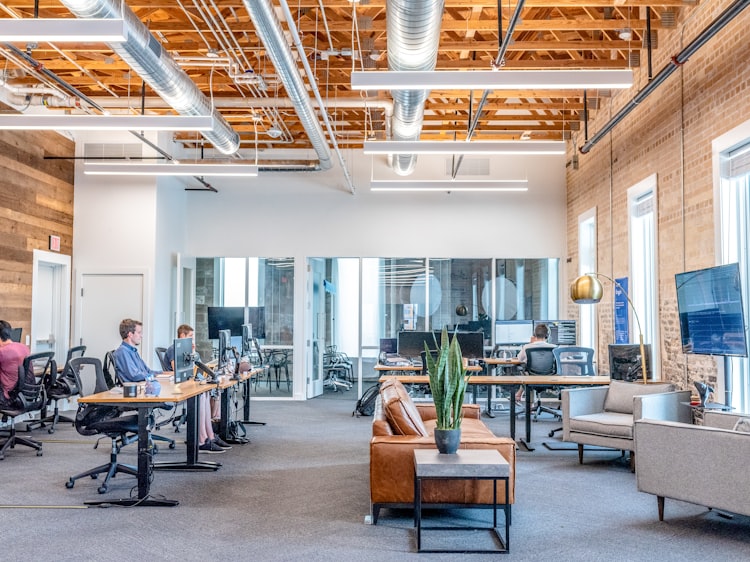The Company of the Future: AI, Profit and Purpose

As you may have noticed recently, Volkswagen has started the production of the ID.3 – the car that induces Volkswagen’s re-birth. Volkswagen has boosted the pace of its transformation to a modern software company. But transformation is not about technology or launching new cars and features. The company of the future must be able to be profitable as well as delivering purpose to its clients and employees. Profit means producing great products at low cost (leveraging AI and machine learning). Purpose means that employees don’t just want money, they want satisfaction and meaning. They want to do something worthwhile with their lives.
This blog post looks into the complex forces that you have to handle to build the company of the future.
If you want to build a great company in our world today, the most important question which you have to answer is: How does a company stay up-to-speed and maintain the same kind of business relationships, both with existing and potential employees and customers, despite of all the technological and developmental changes happening in the workforce everyday? In my opinion, these are the most important factors:
- Trust, responsibility, credibility, honesty, and transparency
- The search for purpose and meaning.
- New leadership models and generational change
- Big systemic thinking
- AI: New kinds of partnerships between people and machines
- From hierarchies to networks
- Free agency, personal brands, and the evolving employer/employee relationship
- Compensation beyond pay
- Diversity, inclusion, and fairness at work
- Board governance and diversity
There are a few factors that influenced this perspective on the future of the firm.
Success requires a more broad systemic thinking about all the players an organization affects; it is no longer as simple as “use its resources… to increase its profits.” There are technological, social and political factors at play, including automation, inequality, climate change, and generational differences. Value investing is the way of the future - not a focus on short-term profits, but on customers and employees.
Trust, responsibility, credibility, honesty, and transparency
Your customer (your user) is your conscience. Customers and employees now look for, and hold accountable, firms whose values reflect their own personal beliefs. We’re also seeing a “trust shakeout,” where brands that were formerly trusted lose trust, and new companies build their positions based on ethical behavior. And companies are facing entirely new “trust risks” in social media, hacking, and the design of artificial intelligence (AI) and machine learning (ML) algorithms.
The search for purpose and meaning
As the global economy has recovered from the 2008 meltdown, there has been a frightening increase in income inequality around the world, and new research shows that in developed markets, only one-third of citizens believe their family will be better off in the next five years. However, employees don’t just want money and security; they want satisfaction and meaning. They want to do something worthwhile with their lives. The increased demand for trust and fairness covered in the previous section is part of a broader search for meaning—a topic of increasing interest and importance to organizations as they grapple with what motivates and inspires their employees, customers, and suppliers.
New leadership models and generational change
Firms of the 20th century were based on hierarchical command and control models. Those models no longer work. The entire concept of leadership has come under question. In successful firms, leaders rely on their influence and trustworthiness, not their position. There are a series of changes taking place. First, leaders are everywhere, even the youngest employees are leading initiatives, teams, and organizations. Second, leaders now lead through influence, not position. Third, we now lead in diverse, multigenerational organizations. Fourth, we need leaders who can iterate, experiment, and learn to quickly solve problems.
Big systemic thinking
While it may be necessary to simplify the components of a business to best understand and apply them, taking the time to do big systemic thinking could be the most important factor to an organization’s sustained existence and success. The firm of the future must be able to adapt to changing environments, changing interactions with its customers, and changing communications patterns within the organization. Every firm must understand their business is a complex system, and that it’s impossible to change one aspect of the organization without affecting everything else. Sometimes, thinking holistically means deciding what not to do. For example, Volkswagen decided to step into the electric era by 100%, since offering combustion engines could get in the way of the company’s strategic decision to pivot from a car manufacturer to becoming a mobility provider.
There are no silver bullets; big systemic thinking can go just as wrong as any other thought process. Getting through the noise to communicate those decisions to employees, to customers, and to the board of directors isn’t simple, either. But without that kind of thinking, you can’t be right.
AI: New kinds of partnerships between people and machines
AI and ML are changing almost every job. This shift raises many questions: Who manages the machines, and how? What skills do those new managers need, and how are they acquired? What kinds of compensation are appropriate? While we don’t know all the implications of automation and AI, we know people will still have important roles. Already, as AI enters roles like retail and customer service, companies like IBM and American Express are hiring people to monitor decisions made by software, improve social cues, and translate machine recommendations into more meaningful recommendations.
From hierarchies to networks
Firms of the future are trending toward networked marketplaces where organizations build on their core competencies and outsource the rest to a network of contractors and free agents. Increasingly, these networks are managed by centralized algorithmic systems. A company such as Uber or Airbnb displays this pattern in its fullness: asset light, algorithm heavy. This causes us to need a new theory of antitrust: one that measures the health of platform marketplace ecosystems, and the extent to which marketplaces compete with their suppliers, rather than simply looking at consumer benefit. Perhaps the biggest change taking place is the rapid evolution away from management hierarchies to networks of highly empowered teams.The firm of the future is a network, not a functional hierarchy.
Free agency, personal brands, and the evolving employer/employee relationship
Employees are free agents, which means hiring and retaining talent is difficult. Firms need to help employees meet their career goals, satisfy employees’ ethical concerns, and more. Employees often seek additional training before changing jobs, and after moving to a new internal job or receiving new responsibilities.It is also worth noting there is a new labor movement building, but it’s not focused on the old labor issues. When Google employees walked out, it was about Google’s failures of social conscience, not about higher wages or working conditions and when 30,000 Starbucks baristas used the coworker.org platform to raise issues with management, the first issue was not higher wages but the dress code.
Compensation beyond pay
The nature of compensation is changing, with firms offering alternate work relationships, more flexible workplaces, training opportunities, additional perks and benefits, and more of a sense of “taking care” of workers. In any given job family, there are employers who pay less (perhaps even “underpay”) but offer more career development opportunities, a more flexible workplace, and more benefits. Others, with more competitive cultures, may pay more - but they expect more. This new bifurcation of pay is letting firms think about all their people as independent agents, and they can now create the optimal mix of pay and benefits for their employees.The firm of the future is one that truly takes care of its workers, trying to entice employees to stay put.
Diversity, inclusion, and fairness at work
It’s well known (but not well practiced) that diverse teams produce better results. But achieving diversity is more than a matter of filling the pipeline with new hires. Diversity requires solving compensation problems, creating a safe workplace, inclusion, and ensuring everyone knows their opinions will be respected. I believe the future of the firm is a new form of responsible capitalism. It is not enough to have social responsibility programs and sustainability programs: companies must gladly pay taxes, they must support and give to political institutions, and they must support the infrastructure-based systems in their communities.
Board governance and diversity
What is the board’s responsibility for the future of the firm, or the firm of the future? Boards are responsible for setting direction and overseeing the day-to-day managers. They’re responsible for ensuring the firm is managed responsibly. Yet, for too long, boards have been hired, bought, and paid for by management. Board independence and increased diversity can help improve board governance. Diverse boards provide broader perspectives and ask better questions, helping improve outcomes and adapting to rapidly changing business environments. A new kind of directors’ college is needed.
Today many corporations suffer from a lack of diversity regarding their boards - not just physical diversity (i.e., race and gender) but cognitive diversity - for tackling difficult issues like digital sophistication, employee welfare, ethics, and trust. Boards need to do a better, more confident job of asking the right questions - about change, digital transformation, cultural changes in the workforce, social media, artificial intelligence, and other (sometimes uncomfortable) topics that boards should address. Board members often miss these questions because they lack the diverse backgrounds that accurately reflect the state of the world.
Conclusion
The next 10 years won’t be like the last 30 years, and won’t be remotely like the last 60. The impact of technology is high. Employees will be changing, and they will love to have opportunities to learn and to make a difference. Diversity is a must. Above all, businesses are complex systems, and simple, reductionist approaches will fail. There are plenty of opportunities for success, perhaps more than ever before; it’s the way toward those opportunities that has changed. Whatever the future of the firm is, it won’t be business as usual.





